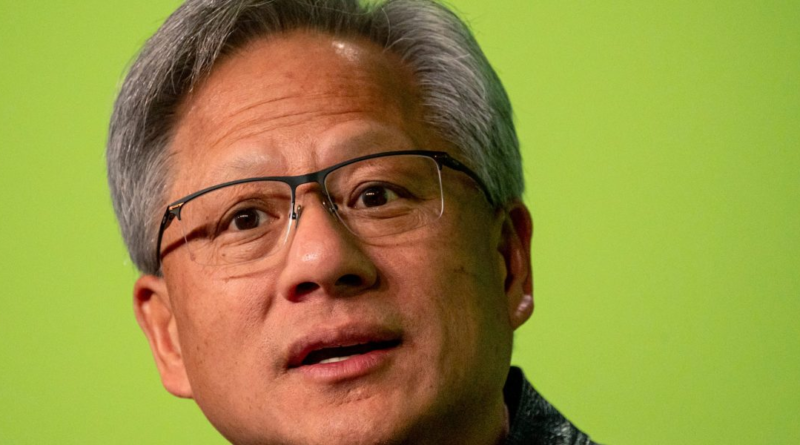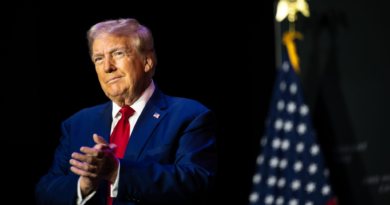All aboard the Nvidia ‘rocket ship’: Executives are raking in company stock awards despite missing out on their bonuses for 2023
Only Nvidia, the suddenly indispensable $2 trillion AI giant, could turn a missing C-suite bonus into a total nonissue. The dominant maker of semiconductor chips missed hitting financial goals in fiscal 2023 related to revenue and non-GAAP operating income, and executives didn’t make two key payout thresholds as a result, as corporate disclosures show the company paid zero cash bonuses in fiscal 2023 to its top team and certain performance-based equity awards failed to vest. However, the structure of the company’s equity program and its blockbuster performance have largely inoculated it from major talent defection.
Take CEO and founder Jensen Huang himself. The board last raised Huang’s bonus pay opportunity in fiscal 2022 to $2 million with an award opportunity of 200% or $4 million, a relatively paltry sum for such an influential tech CEO. His pay stayed at that level until the board’s compensation committee announced a new plan last month for fiscal 2025. (Fiscal year 2025 refers to the company’s fiscal year that ends Jan. 26, 2025.) But the equity program has been worth nearly half a billion dollars for Huang.
Huang received stock worth $61.8 million in value, in addition to $442.8 million in value he derived from exercising options in fiscal 2023. And even though his top executives missed certain goals and only earned a type of performance share unit award, they hit the lights out. The lowest-paid executive on the top team realized $14.8 million when their 75,510 shares vested in fiscal 2023, company disclosures show.
“The calculus that a lot of machine learning engineers are doing right now is between one of two things—join a rocket ship, in which case, Nvidia is about as big of a rocket ship as I can get,” said Khaled Hussein, CEO of tech talent acquisition platform Betterleap. “Or [some engineers] are going to build a rocket ship to do their own thing.”
A ‘fairly competitive’ compensation plan
Huang’s awards include performance share units that are eligible to vest over a four-year period based on attaining certain annual operating income goals, known as SY PSUs. His pay plan includes a second type of performance share unit award based on three-year total shareholder return (TSR) relative to the S&P 500 that is eligible to vest over three years, known as MY PSUs. Last year, the company missed its non-GAAP operating income goal of $13.2 billion, only hitting $9 billion, and the 2023 SY PSUs therefore failed to vest. However, the company’s three-year relative TSR between fiscal 2021 and fiscal 2023 was 189%, landing it at the 99th percentile relative to the S&P 500. Thus, Nvidia’s actual performance exceeded the company’s stretch operating plan goal and the executives earned the maximum vesting of MY PSUs.
“This is a fairly competitive program,” said Brittany McCants, a partner at law firm Barnes & Thornburg.
The link with TSR is a key long-term aspect of the comp scheme, said McCants. “The market’s exuberant interest in the company is really highlighted through the story of the precipitous increase in its stock price,” she said. “That being a significant piece of the compensation package tells me that is the piece of their compensation that people at the executive level will probably value the most.”
A spokesperson for Nvidia declined to comment.
Although Nvidia didn’t pay any bonuses to executives last year after they failed to hit the revenue goal, recruiters say the threat of talent poaching is low, given Huang’s habit of showering employees with equity awards tied to the stock price, which has risen 81% year to date. Nvidia’s market capitalization famously surpassed $2 trillion in February after it released blowout earnings, making it just the third company to join the multitrillion-dollar valuation club, after Microsoft and Apple.
The company’s formidable earnings included record full-year revenue of $60.9 billion, up 126%. Meanwhile, red-hot interest in AI talent fueled a bidding war that has, for instance, moved Elon Musk to raise salaries for Tesla engineers at the risk of their being lured away. Musk said earlier this month that it was the “craziest talent race” he’d ever seen—even more than the 2015 occasion when he lured Ilya Sutskever, a key brain behind the rise of OpenAI, away from Google cofounder Larry Page.
But despite Nvidia’s rising popularity and the mainstreaming of AI, Huang’s team is devoted to his vision, the company, and the potential millions in stock they can unlock if they hold their equity.
“Nvidia is public so those shares are as good as cash, and people are hanging on to their shares,” said Hussein. “Nobody is selling.”
Last year, the company missed its revenue goal of $29.6 billion for fiscal 2023, only hitting $27 billion, and execs earned zero annual bonuses as a result. A year later in March 2024, the Nvidia board announced that it was hiking its annual cash bonus plan for Huang in fiscal 2025 just weeks after the company announced record quarterly revenue of $22.1 billion, an increase of 22% from the previous quarter and up 265% from a year ago.
Notably, Huang saw his bonus opportunity rise from a possible $4 million in fiscal year 2024, to $6 million for fiscal 2025. It marked the third time the Nvidia board has bumped up Huang’s annual cash bonus in the past five years. Bonuses at Nvidia are earned based on hitting revenue goals and Huang’s is set as a percentage of his base salary.
Equity rules everything around Nvidia
Like most tech companies, the lion’s share of Nvidia executives’ pay is delivered in the form of equity. Nvidia is known as a company that doesn’t pay the high salaries or sky-high bonuses of, for instance, financial services companies, but Huang doles out equity awards to employees because of his long-held confidence that the company will continue to grow and that employees will be enriched by their stakes. The desire among outside firms to entice machine learning engineers, general managers, and executives from Nvidia is strong, but because of the high levels of unvested equity the employees have, recruiters haven’t seen much success in coaxing talent out of the company, search experts said.
With some tech companies, there’s sometimes a point at which it becomes possible to try to lure someone away depending on when their equity vests, but with Nvidia’s plan, executives are always seeing upside in the short term, midrange, and long term, said Dora Vell, CEO of Vell Executive Search. “It’s going to be very hard for somebody to move, unless they’re just not a fit there,” she said.
Other top executives, including chief financial officer Colette Kress and Ajay Puri, executive vice president of worldwide field operations, saw their bonus targets stay flat for fiscal 2025, based on the March report. However, while 96% of Huang’s total pay is dependent on corporate performance goals, only about 56% of other executives’ pay is dependent on hitting performance goals. And in fiscal 2023, the Nvidia board increased potential payout values for Kress, Puri, EVP of operations Debora Shoquist, and EVP and general counsel Timothy Teter by $2 million, a raise of about 22% for each executive.
Hussein looks at Nvidia and its rivals in the AI space and says, right now, their executives are “having a moment.”




